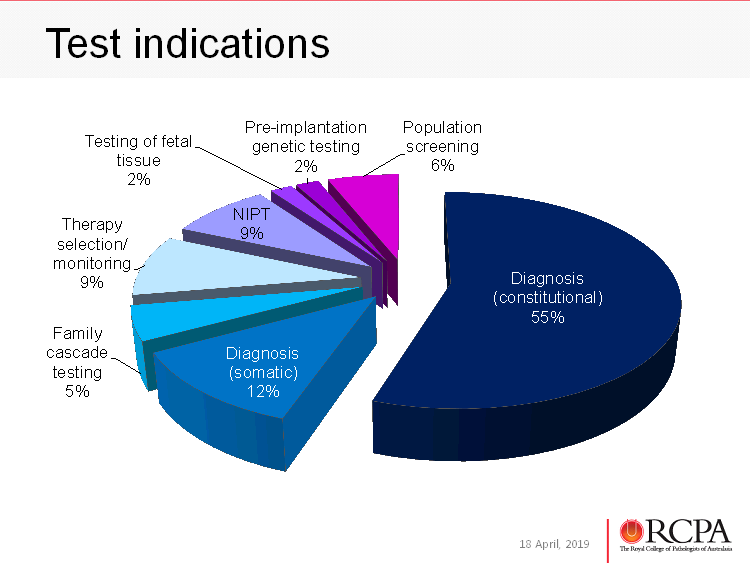Once the preserve of science fiction movies, genetic and genomic testing is now becoming increasingly integrated into healthcare, according to a study conducted by the Royal College of Pathologists of Australasia (RCPA).
Genetic testing refers to specific genes or parts of genes and how those characteristics are passed through generations via DNA. Genomics refers to the entirety of an organism’s genes and analysing vast amounts of DNA data to find variations that impact health, disease, or drug response. Genomics in medicine can also refer to testing all the genes known to be related to a specific disorder e.g. all the genes known to cause intellectual disability or breast cancer.
The report found a 73% increase in molecular test requests over the past 5 ½ years, with more than 660,000 genetic or genomic tests reported during the 2016/2017 financial year.
More than 660,000 genetic/genomic tests were reported over the one-year survey period, which ran during the 2016/2017 financial year.
The field of genetics/genomics is exploring exciting new areas, such as pharmacogenetics – which allows a clinician to look at an individual’s genetic make-up and metabolism in order to prescribe the ideal drug and dosage.
People had genetic tests for a number of reasons, including cancer diagnosis and treatment, looking for inheritable genetic conditions, transplant monitoring, and prenatal screening.
It is also possible through genetic testing to determine which patients will and which won’t respond to a medicine, helping refine and personalise the treatment and to save significant amounts of money on expensive medicines that may not work.
Dr Melody Caramins, a genetic pathologist, explains that the developments in genetic medicine are both a boon to the healthcare sector and a challenge.

While promising a radical improvement in the way we treat patients, the genetics/genomics revolution is also presenting challenges to the medical field.
‘The development of genetic technology has been swift but because it’s moving so rapidly there’s a risk of clinicians not being up to date.
‘That puts a premium on the medical and pathology workforce to help upskill requesting doctors and to integrate these technologies into mainstream healthcare, because the benefits of using these tests responsibly can potentially be enormous.’
The RCPA data shows that GPs were the most frequent users of genomic testing, along with obstetricians, fertility, and foetal medicine specialists: this grouping was responsible for ordering half of the genetic and genomic tests conducted over the last 12 months.
Another way in which genetic/genomic testing is throwing forward challenges is in their funding, although that too has increased in recent years.
‘In 2011, Medicare funding covered about 35% of genetic tests. In the 2016/2017 period that figure rose to 49% of tests being covered by Medicare,’ said Dr Caramins.
‘That increase reflects both the increase in the number of tests being taken as well as the increase in the variety of tests being covered by the Medicare Benefit Schedule.’

